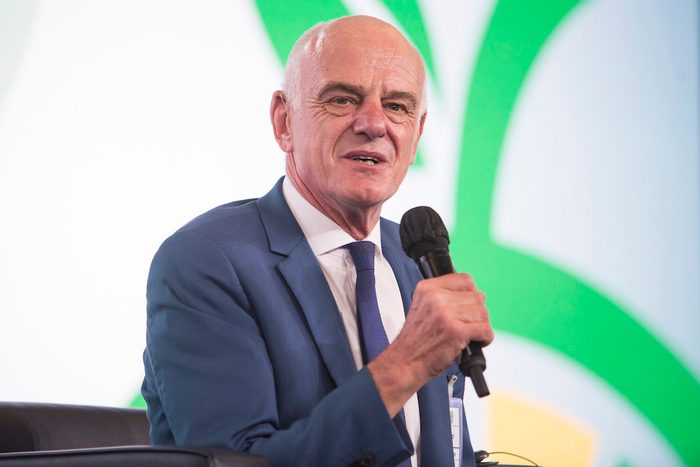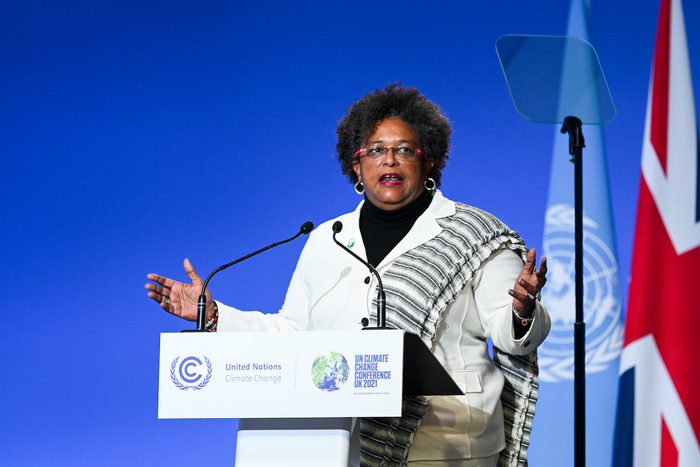Hi, this is Michelle, and today we hear from UN food senior adviser, David Nabarro, why Geneva’s investors and humanitarians must cross over to the other side of Lake Leman and partner up.
In other news for International Geneva, the Argentinian diplomat Federico Villegas will be heading for a year the Human Rights Council. Plus, the Prime Minister of Barbados has won the UN’s highest environmental award. |

|

David Nabarro, senior adviser to the Food Systems Summit. (Credit: UN Photo/Giulio Napolitano)
|
|
🌾 👔 Cooperation for sustainable food systems.
With billions of people worldwide going hungry and the climate emergency only worsening things, the need to shift towards sustainable food production and consumption is increasingly recognised, yet the task is challenging. On the occasion of Geneva’s summit on sustainable finance, Building Bridges, senior adviser to the UN Food Systems Summit, David Nabarro, told us about the need for the finance and aid sector to work together.
Geneva Solutions (EN)
|
|
🇺🇳 Human Rights Council elects new president.
Argentina’s permanent representative to the UN in Geneva, Federico Villegas, was elected on Monday as president of the Human Rights Council, in a move welcomed by Geneva rights experts. Villegas will take over the reins in January from Nazhat Shameem Khan, Fiji’s ambassador, who served as president over the last year. Like Fiji, it will be the first time Argentina has held the presidency role, which rotates annually between regions.
Geneva Solutions (EN)
|
|
Here's what else is happening
|

Prime Minister of Barbados Mia Mottley tells fellow leaders at Cop26 in Glasgow to "try harder". (Credit: Karwai Tang/UK Government)
|
|
🇧🇧 Barbadian Prime Minister Mia Mottley named UN environment champion.
The UN Environment Programme honoured the first female chief of the Caribbean Island on Tuesday with its highest environmental award for her political leadership in climate action. Mottley has been an outspoken defender of the small islands, whose very existence is threatened by the impacts of climate change. The prize also went to three other female laurates, recognised for their work on issues, including zoonotic diseases and air pollution.
Geneva Solutions (EN)
|
|
|
Science & diplomacy reads by GESDA
|
|

Photograph of a quantum machine. (Credit: Erik Lucero, Martinis Group, University of California, Santa Barbara, CC BY-SA 3.0)
|
|
Quantum is the new black.
Not a single week passes without the “magic” of Quantum ending up in the headlines, with big announcements by private firms, countries or academics around major scientific advances in quantum technologies, as a very complete article PhysicsWorld explains (read below). And the field gets even more attention when James Bond’s chief, Richard Moore, head of the UK Secret Intelligence Service (MI6), says that “our adversaries are pouring money and ambition into mastering artificial intelligence, quantum computing and synthetic biology, because they know that mastering these technologies will give them leverage...” Still, “a curmudgeon might argue that quantum computing is like fusion, or any promising tech whose real rewards are – if even achievable – decades off. The future remains distant, and all the present has for us is smoke, mirrors, and hype”, starts another article in IEEE Spectrum.
The latter excerpt is actually from an interview of John Martinis, former chief architect of Sycamore, the quantum processor developed by Google. And – albeit a bit technical – this article is worth reading because it breaks things down well. In a nutshell: Announcing ever bigger numbers of qbits (the unit elements of a quantum computer) is fine to show muscle. But the next big step to make is reducing errors rates on those qbits, hence improving the reliability of those systems.
“There will be more focus on the systems engineering aspects of building a quantum computer,” foresees Martinis. “As an important part of systems engineering is testing, better metrics will have to be developed. [...] With such a new technology, it is hard to understand how progress is being made. I think we can all work on ways to better communicate how this technology is advancing.” Finally, he states that “a suite of standards will help the business community and investors, as they will be better able to understand what developments are happening”.
In other words, after the hype, there is now a strong need to embed quantum technologies into daily reality for the benefit of all on the planet. And this is a task where International Geneva, with all its dedicated international institutions – starting with the International Organization for Standardization ISO –, can play a big role.
Olivier Dessibourg, GESDA
(EN)
|

This selection is proposed by the Geneva Science and Diplomacy Anticipator
GESDA, working on
anticipating cutting-edge science and technological advances to develop innovative and inclusive
solutions for the
benefit of the planet and its inhabitants.
|
|
GS news is a new media project covering the world of international cooperation and development. Don’t hesitate to forward our newsletter!
Have a good day!
|

|
|
Avenue du Bouchet 2
1209 Genève
Suisse
|
|
|
| |











